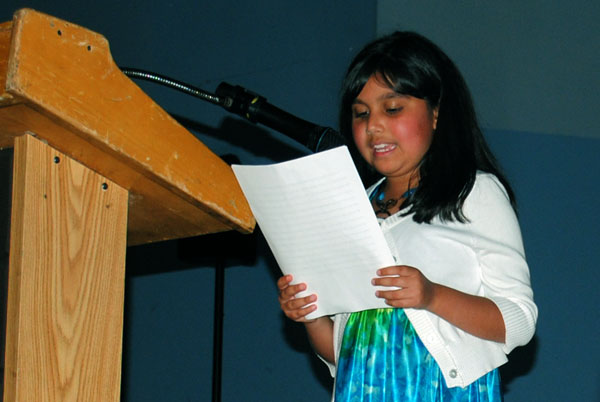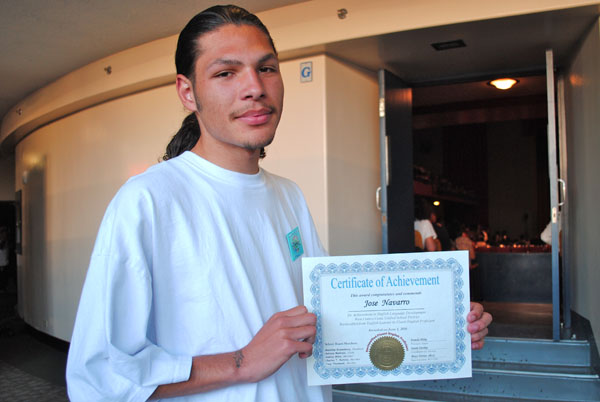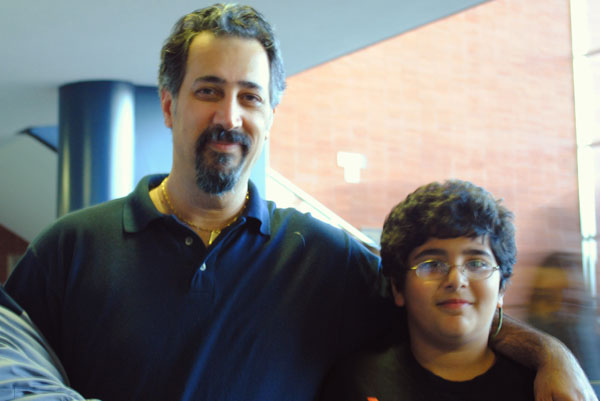When she was in the first grade, Yassna Ahmadi had a hard time understanding her classmates and teacher. At home her family only spoke Farsi. Now a third grader, Ahmadi just won first place in a writing contest and read her essay in front of an audience, speaking flawless English.
“As some of you may know, I was born in Berkeley, California but my parents came to the United States from Afghanistan many years ago,” she read from her essay. The child of immigrant parents, Ahmadi is not alone, especially in the West Contra Costa School District, where one third of the students are non-native English speakers.
Because so many of its students are English learners, the district organizes the Annual Reclassification Award Ceremony. This event celebrates the accomplishments of children have been “reclassified,” which means that the kids have become fully proficient in English and are no longer considered English learners. On Tuesday, hundreds of immigrant families supported their children at the 11th such award ceremony. More than 900 kids received their diplomas this year and the winners of the 2010 school district essay contest read their work aloud at the Richmond Civic Center Auditorium.

“Proficiency in English as a second language is a great effort and shows hard work,” said Marin Trujillo, Community Engagement Coordinator for the school district. “This school district is the only one in California that organizes an event of this kind,” said Trujillo, pointing out that the achievement of English proficiency is often overlooked.
To achieve reclassification, the school district considers at a number of elements. “We look at the whole picture,” said Susan Dunlap, the district’s English Learner Service Coordinator.
The students have to pass the California English Language Development Test and the California Standards Test. The district requires an essay written at the fluency level of a native English speaker. The students also need to learn grade-level content taught in English and their parents are consulted about their kids being ready for reclasification.
“It’s challenging to learn math and science in a language in which you are not proficient,” said Dunlap. She explained that English learner students get academic support from the schools until they are reclassified.

According to the 2010 school district census, 9,556 out of the district’s 30,000 students are considered English learners. There are 75 different languages spoken among them, but 82 percent of the students speak Spanish. The most commonly spoken languages after Spanish are Filipino, Vietnamese, Punjabi, Mien, Arabic, Cantonese, Lao and Urdu.
Students who identify themselves as Latino make up 52 percent of the district’s students. However, a student who speaks a language other than English as their native language does not necessarily need to be reclassified. Some students are already bilingual and proficient at both languages, explained Dunlap.
According to Dunlap, reclassified students from the West Contra Costa District do better on the California High School Exit Examination than all other student groups in the district. Last year 92 percent passed, the highest pass rate in the county and state for reclassified students. “We believe that they are well prepared to continue their studies,” Dunlap said.
At the award ceremony, the presenters spoke in both English and Spanish or used a translator, making it a bilingual event.
“Kathryn got into first grade and she didn’t know any English,” María Anchante, a Peruvian seamstress and single mother said in Spanish, of her 8-year old daughter Kathryn Navarro, who got a diploma at the ceremony. Anchante said that she speaks “very little” English, but that her daughter had a teacher who helped her after school. “She’s a great student. She’s always reading and writing,” said Anchante.
“In the future, I would hope to be a writer. I want to write biographies,” said Navarro, satisfied with their achievement.

Sometimes students get more help at home. That’s the case for Kevin Fereidooni, an 11-year-old student who is now officially proficient in English. His father, Nader, an Iranian immigrant would speak English to him as a baby and encourage him to watch cartoons on American TV.
In the case of 5th grader Jan Charlie Sanchez, his father and sister speak English but his mother doesn’t. “During first grade I understood a little, but by second grade I understood everything, ” Sanchez said. His little brother Anthony is bilingual at the age of 6.
During the ceremony family members cheered when each child got a diploma. “We are very proud that our son speaks perfect English,” Affra Valencia, Sanchez’s mother said in Spanish.
June 4, 2010 Richmond Confidential

